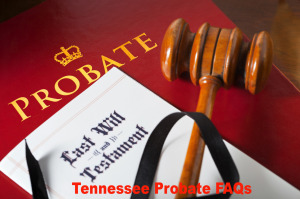Tennessee Probate Law: Frequently Asked Questions
 Probates, Wills, And Estates:
Probates, Wills, And Estates:
- What kind of legal assistance is needed for probating an estate?
Unless real estate is your business, it’s unlikely that you’ll be able to cope with all the complexities that come with Tennessee Probate law. The process is riddled with deadlines and details – a good lawyer can navigate you through the legal jargon with ease, but alone… The odds are not in your favor.
In some places, such as Davidson County, fiduciaries filing to probate an estate must do so via a licensed attorney.
- Is there a specific county in which I need to file probates for a deceased person’s will?
The basic response to this question is that probate petitions for a deceased individual are to be applied within the county of residence at the end of his or her life. If the deceased claims more than one qualified residence, any county in which such an estate resides is an acceptable county to submit a petition.
- What amount does Inheritance Tax exemptions cover in Tennessee?
According to an adjustment made in 2012, Tennessee Inheritance Tax exemption amounts (by death date) are:
- 2012: $1 million;
- 2013: $1.25 million;
- 2014: $2 million;
- 2015: $5 million,
- 2016+: Inheritance tax no longer exists in Tennessee.
- How does Tennessee recognize probate assets?
If an estate can claim assets which are probably going to necessitate the official probate administration procedure – and this is why many people choose to hire a probate attorney. The probate process is extremely complex. Common examples of assets are:
- Allocation of an estate as a beneficiary, as listed by life insurance policies from decedents;
- Retirement plans which reveal the beneficiary to be the decedent’s estate (IRA, 401K, etc.).
- “Tenants in common” assets (asset documented by decedent as tenants in common;
- Assets without beneficiaries, or involved with some form of joint ownership, in the name of the decedent.
- Why do people in Tennessee usually have wills?
- Decrease chances of tension between family, prospective heirs or beneficiaries, and close friends when you die.
- Clarification of your intentions to identify who will succeed you as your children’s legal guardian upon your death.
- Allocation of assets and other resources – where your stuff goes when you die.
- Are any assets not considered probate by Tennessee courts?
Certain assets exist on the exterior of probate procedure, including:
- Documentation of plans which indicate particular beneficiaries (401K, IRA);
- Assets existing in deceased’s name, with entire ownership transferring to joint owners upon death via right of survivorship. Such assets are transferred promptly post-death to the other persons in question.
- Life insurance documentation in which anyone besides a deceased person’s estate is the beneficiary;
- Assets allocated to beneficiaries outside the deceased’s estate which are titled by the name of a decedent – these will say “pay upon death” or “transfer upon death.”
- What’s the difference between “death intestate” and “death testate?”
“Death intestate” is the term used to describe an individual who has died and does not have a will. Their assets are at the mercy of Tennessee court procedure – so it is absolutely crucial to assure “death testate!” This is the opposite of death intestate, and so refers to persons who die in possession of a will. Having or not having a will upon death will decide whether you or the Tennessee government decides the following:
- Who gets custody of your child?
- Who gets to run your estate?
- Where will your assets go?
- Who is trustee of my estate? What about my children?
- What are the kinds of wills offered in Tennessee?
Tennessee offers three (3) varieties of will (each in accordance with TCA regulation):
- Normal will;
- Holographic will (handwritten by testator before death);
- Nuncupative will (drafted while in immediate danger of death)
- Who is applicable to be potential conservators for disabled people?
Tennessee courts use this list to determine those who qualify as conservators for “disabled persons:”
- Children of disabled;
- Anyone chosen by disabled, with justification in writing;
- Nearest relation to disabled individual;
- Spouse of disabled person;
- Other persons deemed acceptable by court.
- Who can request for a conservator’s appointment in Tennessee?
Tennessee law allows anyone related to the case to file a petition for a conservator, as long as he or she can prove comprehension of a given situation.
- In Tennessee, what are the qualifications for those wishing to prepare a will?
The only prerequisite for persons in Tennessee wishing to make a will is that he or she be of “sound mind” and over the age of eighteen (18) years.
 Probates, Wills, And Estates:
Probates, Wills, And Estates:



